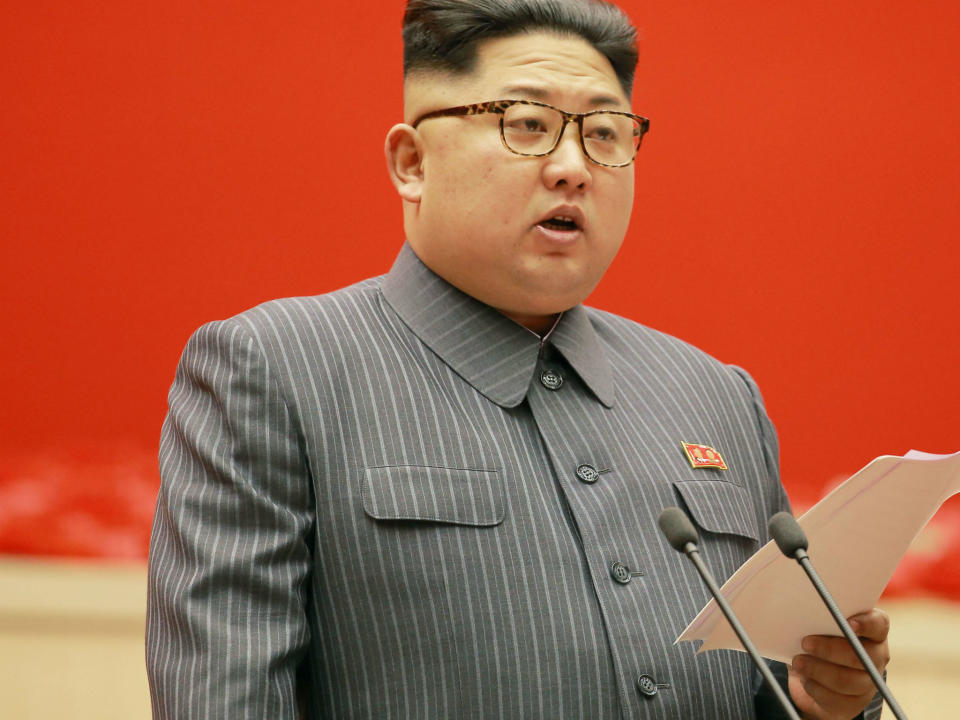North Korea announces it will stop all nuclear tests and missile launches as Trump hails 'big progress'
North Korea has said it will halt missile and nuclear tests, fulfilling a pledge made by leader Kim Jong-un ahead of a meeting with Donald Trump.
The promised cessation, reported by North Korean state media, represented another apparent concession as the country manoeuvres ahead of the landmark summit.
Mr Kim also said North Korea would be shutting down a test site.
South Korea’s president earlier this week said Mr Kim had embraced denuclearising without demanding the withdrawal of US troops from the Korean Peninsula.He said it was "meaningful progress".
Mr Trump heralded the development on Twitter as “very good news for North Korea and the World”.
“Big progress! Look forward to our Summit,” he added.
On Saturday Britain also welcomed the news. A Foreign Office spokeswoman said: "A long term commitment from Kim Jong-un to halt all nuclear tests and ICBM launches would be a positive step. We hope this indicates an effort to negotiate in good faith.
"We remain committed to working with our international partners to bring about our goal of a complete, verifiable and irreversible de-nuclearisation of the Korean peninsula, and to do so through peaceful means."
Numerous other countries welcomed the announcement, including Sweden, which has strong diplomatic relations with North Korea and China, which is North Korea's main ally.
Margot Wallstrom, Sweden's Minister for Foreign Affairs said it was "good news" that progress was being made "to de-escalate and to defer from further bomb and missile tests."
But she added: "We have to keep the pressure up with the sanctions regime and everything else we are doing."
China's Foreign Minstry spokesman Lu Kang was quoted by the official Xinhua News Agency as saying that the move by North Korea, was a step on the path to peace and denculearisation of the peninsula, that it will help ease political tensions and also help economic ambitions.
"We hope that the DPRK will continue to achieve results in its economic development and improvement of people's living standards," said Mr Lu, according to Xinhua.
China reportedly hopes to help improve relations and resolve the concerns of all involved "through dialogue".
The Russian Foreign Ministry also welcomed the announcement and called on the US and South Korea to reduce their military activity in the region.
Other countries, including Japan, were more cautious with their responses.
Japan's Prime Minister Shinzo Abe said it was a positive development but added: "What is crucial here, however, is how this development is going to lead to the complete, verifiable and irreversible dismantlement of nuclear arms, weapons of mass destruction and missiles."
Australian Foreign Minister Julie Bishop said "verifiable steps" would be needed to ensure testing had indeed been halted.
German Foreign Minister Heiko Maas added that North Korea must "disclose its complete nuclear and missile programme in a verifiable way".
UN officials cautiously welcomed the news.
U.N. Secretary General Antonio Guterres said: "the path is open for the peaceful denuclearization of the Korean Peninsula."
He wished the two Koreas "every success in their courageous and important task of resuming sincere dialogue leading to sustainable peace on the Korean Peninsula."
The U.S. ambassador to the United Nations said the pressure that the UN had put on North Korea had worked as it allowed them to be isolated "until they had a good behaviour, and now we are seeing they want to come to the table."
But the move also functioned as an assertion of North Korea's negotiating position. Mr Kim said in a reported statement that tests were no longer necessary because North Korea had achieved its goal of developing a functional nuclear arsenal.
In proposing the talks and moving to suspend his nation’s displays of military prowess, Mr Kim pivoted sharply from his more aggressive stance in the preceding months.
Pyongyang tested multiple intercontinental missiles, hurling two of them over Japan and offering evidence of its professed ability to strike the US mainland.
The country also tested a powerful nuclear weapons that experts believe was almost certainly a hydrogen bomb.
After those displays prodded the United Nations to impose layers of suffocating sanctions - and led Mr Trump to repeatedly threaten the use of military force - Pyongyang used the Winter Olympics in South Korea to abruptly shift tacks.
A delegation of North Korean athletes travelled across the border, accompanied by Mr Kim’s sister, and high-level talks between the two nations followed. South Korean officials then carried Mr Kim’s message to Mr Trump.
CIA director Mike Pompeo has since been dispatched to North Korea to meet with Mr Kim and lay the groundwork for talks.
Earlier this week, Mr Trump reiterated his administration’s dual approach of pursuing diplomacy and maintaining “maximum pressure” with biting sanctions.
He also professed a willingness to abandon talks if they seemed to be leading nowhere.
“If I think that it's a meeting that is not going to be fruitful, we're not going to go”, Mr Trump said. “If the meeting, when I'm there, is not fruitful, I will respectfully leave the meeting.”
Korean Peninsula."
Agencies contributed to this report.

 Yahoo Sport
Yahoo Sport 







































